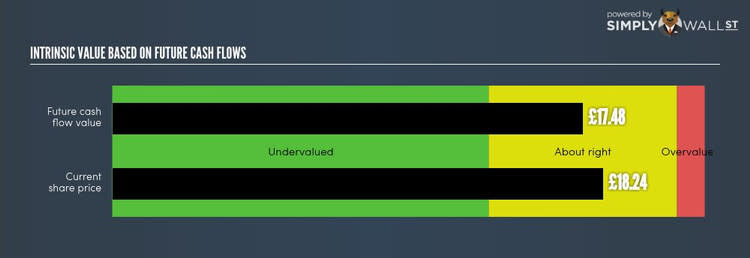Estimating The Intrinsic Value Of Ultra Electronics Holdings plc (LSE:ULE)

Today I will be providing a simple run-through of the discounted cash flows (DCF) method to estimate the attractiveness of Ultra Electronics Holdings plc (LSE:ULE) as an investment opportunity. If you want to learn more about this method, the basis for my calculations can be found in detail in the Simply Wall St analysis model. Also note that this article was written in November 2017 so be sure check the latest calculation for Ultra Electronics Holdings here.
Crunching the numbers
I will be using the 2-stage growth model, which, as the name states, takes into account two stages of growth. The first stage is generally a higher growth period which levels off heading towards the terminal value, captured in the second ‘steady growth’ period. To start off, I pulled together the analyst consensus forecast of ULE’s levered free cash flow (FCF) over the next five years and discounted these figures at the rate of 8.3%. When estimates weren’t available, I’ve extrapolated the average annual growth rate over the previous five years, capped at a reasonable level. This resulted in a present value of 5-year cash flow of £342M. Want to understand how I calculated this value? Read our detailed analysis here.
Above is a visual representation of how ULE’s top and bottom lines are expected to move in the future, which should give you an idea of ULE’s outlook. Then, I determine the terminal value, which accounts for all the future cash flows after the five years. I think it’s suitable to use the 10-year government bond rate of 2.8% as the steady growth rate, which is rightly below GDP growth, but more towards the conservative side. The present value of the terminal value after discounting it back five years is £1,012M.
The total value is the sum of cash flows for the next five years and the discounted terminal value, which results in the Total Equity Value, which in this case is £1,355M. The last step is to then divide the equity value by the number of shares outstanding. This results in an intrinsic value of £17.48, which, compared to the current share price of £18.24, we see that Ultra Electronics Holdings is fair value, maybe slightly overvalued at the time of writing.
Next Steps:
Whilst important, DCF calculation shouldn’t be the only metric you look at when researching a company.
For ULE, I’ve put together three important factors you should further research:
PS. Simply Wall St does a DCF calculation for every GB stock every 6 hours, so if you want to find the intrinsic value of any other stock just search here.
To help readers see pass the short term volatility of the financial market, we aim to bring you a long-term focused research analysis purely driven by fundamental data. Note that our analysis does not factor in the latest price sensitive company announcements.
The author is an independent contributor and at the time of publication had no position in the stocks mentioned.

